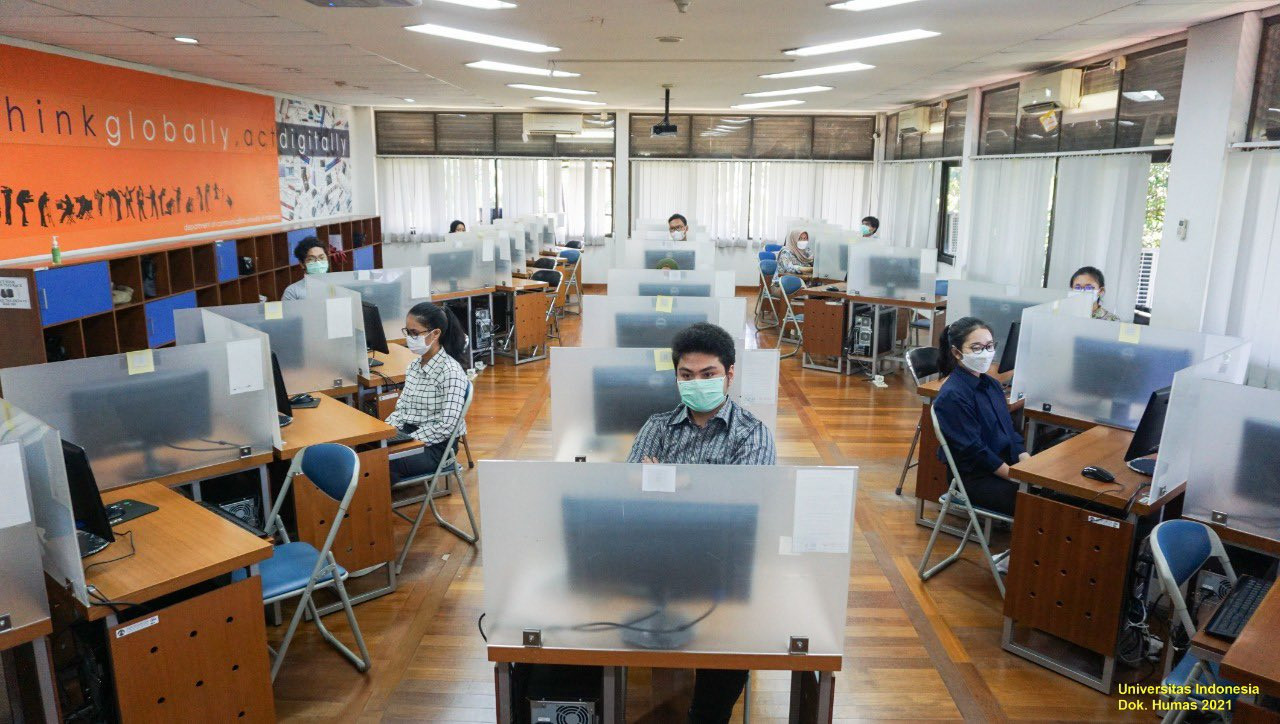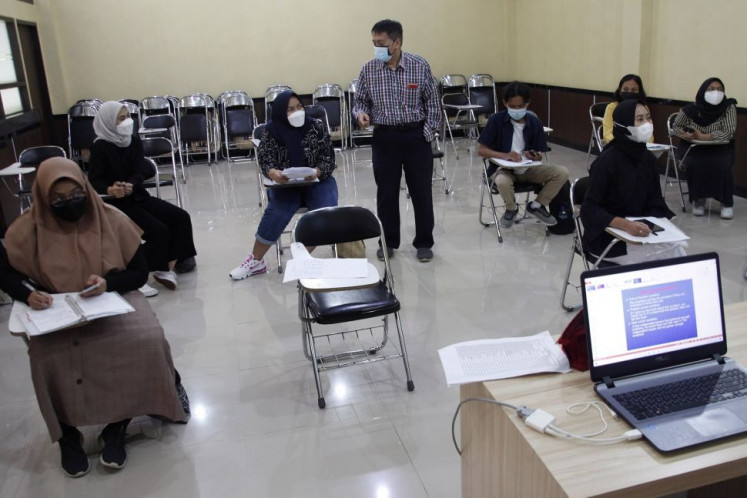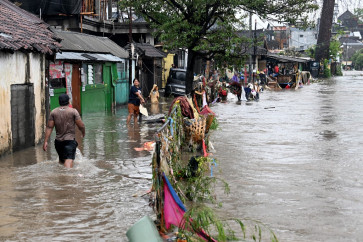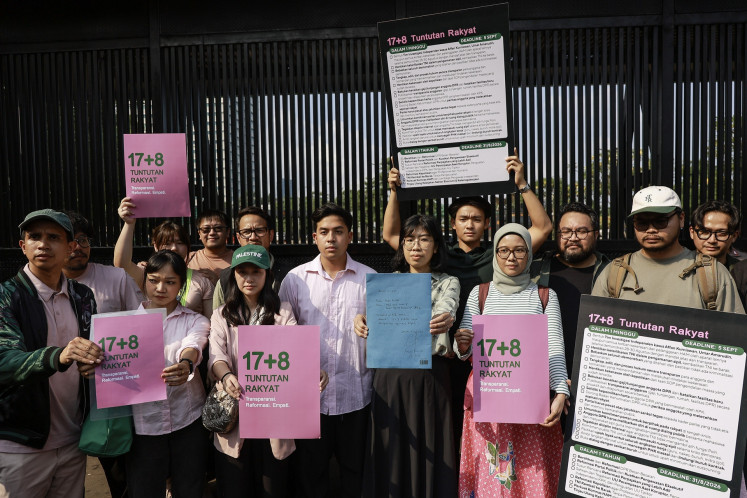Popular Reads
Top Results
Can't find what you're looking for?
View all search resultsPopular Reads
Top Results
Can't find what you're looking for?
View all search resultsFatigued, unable to focus, students unsure about universities reopening soon
To reopen or to not? Some University students want classes to reopen soon but others remain skeptical
Change text size
Gift Premium Articles
to Anyone
S
tudent Revin Muhammad was in the early days of his second semester when the COVID-19 pandemic hit and classes moved online. University life should have been fun, a time of transitioning into adulthood with the wide-eyed vigor of a teen - eager to study hard and confident in pursuing dreams. Alas, the 20-year-old, like many others, has had to avoid physical socializing and learning.
“I do miss my friends,” Revin admitted, “and I have quite a fear of missing out. Especially due to the fact that I now live in Bandung, whereas most of my [university] friends are in Jakarta. When I see them hanging out, I want to join them.”
Revin studies international relations at the University of Indonesia (UI) in Depok, West Java, on the outskirts of Jakarta.
Missing his friends is not the only reason Revin is eager for universities to reopen soon. Online classes present a tough dynamic to which students like him find trouble adjusting.
“I feel like I’m deprived of proper interaction. Virtual meetings rely on a twisted sense of sight and hearing, and it’s causing my attention span to deteriorate,” he says.
“No matter how excellent the lecturer is at teaching, online classes still decrease the effectiveness of their teaching. As for those classes I’m [already] not really able to catch up with in offline classes, online classes just make it worse,” Revin said.
He said that online classes led to reduced discipline and increased the temptation to tune out. Students can simply turn off their camera and “go to sleep.”
“But I wouldn’t be able to do that in an offline class, and that’s exactly what’s needed in order to learn.”
An experiment: Universitas Sebelas Maret, a public university in Solo, held an offline learning trial in April 2021. (Antara/Maulana Surya)Namira Fathya, a 20-year old political science student at UI voiced similar concerns.
“Online learning causes me to feel so fatigued. It’s been three semesters, and I feel really drained. I’m no longer able to keep up with most of the class materials. While I used to pay attention and take notes in offline classes, now I just screenshot most of them.”
Online campus learning also poses limitations, especially when it comes to activities that go beyond conventional classroom learning. These are an integral part of the “college experience” that connects students and develops them as people and future professionals.
Revin says that at his university, “Student board and organization meetings can start at 8 p.m. and end at midnight—which is crazy! Just because it’s online, people think it’s okay. It blurs the boundaries between private and ‘working’ time,” said Revin. These things can lead to exhaustion, which impacts class performance. Meanwhile, Namira is longing to have these campus events back offline. “[The events] are hard to enjoy online. There’s no physical interaction, preparations are done from home […] it takes all the fun away.”
Students who, in a normal situation, would be classmates, also find themselves less able to connect as friends.
“My friend, a fellow UI student living in Bandung, was having serious personal trouble that made it impossible to attend classes for quite some time, but no one noticed [because the person] doesn't live in Jakarta, and didn’t ask for help. Had we attended offline classes as normal, we could’ve noticed their absence. It would be easier to help or visit them. But online classes mean my friend’s—and many others’—struggles go unnoticed,” Revin said.
The struggles are not limited to students, but lecturers as well. Lulu (not her real name), a lecturer at a public university in Yogyakarta, shared her struggles.
“It’s difficult to maintain interaction. We’ve lost the ability to supervise [students] in online classes, [not knowing] whether they’re paying attention or not, or whether or not they understand. Not to mention, I cannot get to know them personally and understand their characters through the camera, which is something essential for me as teaching staff, and something I can do well during offline classes.”
Student board and organization's [offline] activities were a common part of university life, but most have been postponed due to pandemic or moved online. (Anak UI website/Courtesy of anakui.com)But, unlike Revin, Nami and Lulu have their doubts about completely reopening universities.
“The COVID-19 rate is still alarmingly high. I don’t feel safe attending offline classes. My closest ones also have been infected, I don’t want to make this situation worse,” she said.
“Not to mention that most students are nowhere near the vaccine priority list, so I’m sure that the majority of us have yet to be vaccinated. Without vaccines, we’re not as safe.”
Meanwhile, Lulu is worried not only due to the health concerns that she has as a mother of a new-born baby, but also in terms of practicality. Her university’s proposed practice of having half of a class’s students online and the other half offline, would mean having to install cameras and other supporting technical equipment in every classroom.
Lulu added that for many students who had planned on moving to Jakarta to attend university but were now back in their respective hometowns, online learning meant saving money that they would have to spend living in the city during the pandemic.
And so Lulu concurs that for now “Offline teaching will waste more time as I have to spend extra time on getting ready and commuting. Not to mention that once I’m at the office, there could be unexpected work that forces me to come home late. My husband also works, so it will be difficult to look after the baby. Meanwhile, online teaching from home allows me to take care of my baby while getting work done.”
Revin, Nami and Lulu understand that different students experience pandemic-era learning in different ways. “Many senior students take internships and work while finishing up their studies. With such a workload, I understand if they prefer online classes,” Revin said.
Lulu has had to witness the struggles of her university in managing the needs of many different classes, staff and students. She empathizes with colleagues who are eager to go fully back to the classroom.
“I’m still considered young for a lecturer. Compared with my senior colleagues, I can adapt well to technology and changing situations. But for those who struggle to adapt, online teaching may pose a very difficult obstacle to teaching conveniently [and] to get their work done. Who are we to blame them?”



![Student board and organization's [offline] activities were a common part of university life, but most have been postponed due to pandemic or moved online.](https://img.jakpost.net/c/2021/05/06/2021_05_06_113068_1620309435._medium.jpg)








